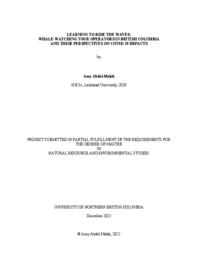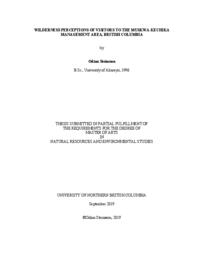Moghimehfar, Farhad
Person Preferred Name
Farhad Moghimehfar
Related Works
Content type
Digital Document
Description / Synopsis
The COVID-19 era and related restrictions have impacted British Columbia (BC) whalewatching operators and their perspectives on whale-watching and tourism-government relations in BC. Despite the popularity and importance of whale-watching in BC, and its relative freedom from restrictions given its outdoor operations, tour operators had to negotiate dynamic constraints during the COVID-19 era. Federal and provincial government responses to the pandemic directly impacted whale-watching, for example, by changing the capacity or number of tourists allowed per vessel. Restrictions also impacted additional goods and services offered by some tour operators, such as refreshments. Adapting to such changes required a certain agility on the part of operators. Many operators also accessed key government supports such as loans and wage subsidies. This paper is based on a mixed methods research project centered on qualitative interview-based research and analysis. It was also informed by limited participant observation on whale-watching tours. Here, we present data gleaned from virtual interviews with 10 whale-watching tour operators. These operators represent approximately 1/4 of 39 active existing operators on and around Vancouver Island, British Columbia, Canada. We offer participant responses and greater response patterns with respect to: 1) how COVID-19 impacted whale-watching operations in BC, 2) what, if any, pivots or changes operators made in response, 3) which supports they accessed and their evaluations of them, and 4) their perspectives on the future of BC whalewatching. We begin with an introduction to: whale-watching in BC; COVID-19’s impacts on tourism as well as government responses to these; key concepts such as the Tourist Area Life Cycle, and ideas about how tourism weathers crises. We then present results highlighting key barriers, opportunities, and adaptations experienced by the tour operators, emphasizing their own words. We end by considering longer term implications for whale-watching in BC. This paper was written for both academic and applied audiences.
Origin Information
Content type
Digital Document
Description / Synopsis
The Muskwa-Kechika Management Area (M-KMA) in northern British Columbia is globally significant for its size, special resource management, and cultural and ecological values. These characteristics were secured in perpetuity through the British Columbian Government’s M-KMA Act in 1998. However, today low public awareness and engagement are seen as threats to the M-KMA’s effectiveness and longevity. Using a mixed-methods approach, this research examined the role of awareness and engagement in safeguarding the M-KMA by conducting semi-structured interviews and a media analysis, both of which informed a public survey. Informing the research design were underlying theories in sense of place, place branding, and the relationship of planned behaviour to place-protective behaviour. Additionally, resource management practices like ecosystem-based management informed the research design and methods of public participation in policy formation.
Origin Information
Content type
Digital Document
Description / Synopsis
The Muskwa-Kechika Management Area (MK) in northeastern British Columbia, Canada is approximately 6.4 million hectares in size, with about 27% in parks and protected areas. I conducted and analyzed qualitative in-depth interviews, with the focus on the social perception of wilderness amongst users of the MK. Results indicate that users feel the MK is a prime wilderness area with exceptional opportunities to experience wilderness attributes such as solitude, both on the periphery and in the interior of the MK. To experience peace and quiet is one of the primary reasons for a visit to the MK. Where resource activity is encountered is critical to the wilderness experience. The closer a development is to the highway or in the beginning of a trip is more acceptable. Findings from this study can assist organizations such as the MK Advisory Board in identifying how specific resource development proposals might impact various wilderness experiences.
Origin Information



